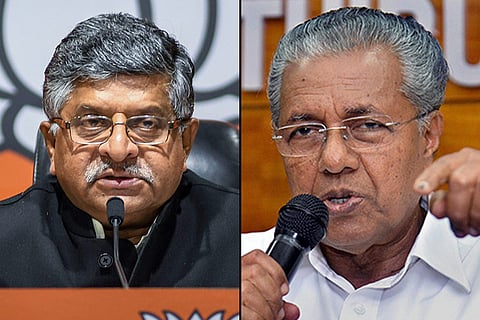

Three months after the state of Kerala declared that an internet connection has been made a basic right in the state, Union Minister Ravi Shankar Prasad announced in the Rajya Sabha that it is a “misconception” that the right to internet can be a considered a fundamental right. The minister, responding to a question about internet shutdowns in India, quoted the Supreme Court judgment from January 9 and stated that the apex court had said in its judgment that no lawyer argued that right to internet is a fundamental right.
“This kind of misconception needs to be corrected. What the honourable Supreme Court has stated is that for communication of your ideas and views, the use of internet will also be held to be a part of your fundamental right of speech and expression,” Prasad, who is the Communications, Electronics & Information Technology Minister, told the Upper House.
He, however, added that reasonable restrictions will also apply to this fundamental right.
“...the Supreme Court itself has declared that the use of the internet to propagate one’s views and writings will be held to be a fundamental right. It is already declared under 19(1)(a). But, the larger issue, I would like to flag is, that this will also be subject to reasonable restriction under 19(2) for public order, for security, for the integrity of India which also regulate the right of freedom of speech and expression,” he said.
The minister quoted the security of the country as equally important to further his argument.
“Can we deny that the internet, a fine creation of the human mind, is not being abused by terrorists, by agent provocateurs, by giving fake news, demanding other kinds of exhortation for communal violence? Therefore, what the law agency does is that they do it (shutdowns) periodically across the country,” the minister said.
This comes three months after the government in Kerala decided in November 2019 to provide an internet connection to all households in the state. The Kerala Cabinet approved a Rs 1,548-crore Kerala Fibre Optic Network project which would be free for 20 lakh below poverty level (BPL) families and is expected to be completed by December 2020. (Also read: Why Kerala has declared internet access a basic human right)
A researcher in the United Kingdom has noted Kerala’s initiative in a study that stated that free internet access should be a basic human right. In his findings, Dr Merten Reglitz, a lecturer of Global Ethics at the University of Birmingham, stated that the human right to internet access was similar to the global right to health and that the internet could be a key way of protecting other basic human rights such as life, liberty, and freedom from torture -- a means of enabling billions of people to lead 'minimally decent lives'.
In the year 2016, the United Nations had also passed a resolution on the promotion, protection and enjoyment of human rights on the Internet and condemned countries that “intentionally disrupts internet access” of its citizens.
Earlier this year, while hearing a petition against the internet shutdown in Kashmir, the Supreme Court stated that there cannot be an indefinite shutdown and asked the government to review all its restrictive orders in the Valley.
Notably, the Kerala High Court had in September 2019 also stated that internet is a fundamental right under Article 21 of the Constitution. The High Court Bench of Justice PV Asha was hearing a petition filed by a student against restrictions on the use of mobile phones inside the girls’ hostel.
Citing a 1989 Supreme Court judgment, the High Court had noted that the Supreme Court had held that the fundamental freedom under Article 19(1)(a) can be reasonably restricted only for the purposes mentioned in Article 19(2) and the restriction “must be justified on the anvil of necessity and not the quicksand of convenience or expediency.”
“It was held that freedom of expression cannot be suppressed on account of threat of demonstration and processions or threats of violence which would tantamount to negation of the rule of law and the surrender to blackmail and intimidation,” the High Court judgment had read.
Also read: How a Kerala student won the fight against restrictions on mobile use in hostel